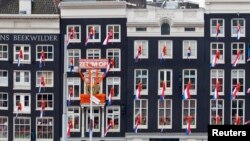After Britain voted to leave the European Union, Brussels fears other members could leave the bloc. In the Netherlands, just as in Britain, there are big concerns over immigration and sovereignty – and growing demands for Dutch voters to have their own referendum on EU membership.
In the town of Maastricht deep in the south of the Netherlands, the barge and the bicycle are the best ways to get around. Aside from a small plaque next to the River Maas, there are few signs of the historic role the town played in the history of the European Union.
In 1992 leaders of 12 European states gathered in Maastricht to sign the treaty that bears the town’s name - creating the modern European Union and setting it on the path of ever-closer political and monetary union.
But Maastricht now finds itself in the heart of the Netherlands’ most ‘Eurosceptic’ region. Recent polls show half of Dutch voters want a referendum on EU membership – with support strongest in the conservative south.
Laurence Stassen lives in the nearby village of Echt. She is a former member of the European Parliament and recently joined the newly formed ‘For The Netherlands’ party, which is campaigning for a Dutch exit from the EU.
“As a nation state, we should have our own borders, our own courts, and to make our own laws – and not the people in Brussels or the European Union.”
Stassen used to be a member of the far-right ‘Freedom Party,’ led by Geert Wilders, which currently tops opinion polls. Wilders has campaigned against what he calls the ‘Islamization’ of Europe and has demanded that the Dutch, like the British, have a vote on EU membership.
WATCH: After Brexit is 'Nexit' Next?
Separate issues
Stassen says the links are unhelpful.
“I think it’s a separate issue, because Brexit is all about getting the sovereignty back. But, however, there are a lot of concerns about immigration.”
Follow the barges from Maastricht down river and you reach Rotterdam, Europe’s biggest port. It handles 465 million tons of cargo every year, connecting the powerhouse economies of northern Europe with the rest of the world.
“Much of the prosperity both in the Netherlands and in Europe as a whole that we’ve gained over the last decades depends on the free trade and movement of goods and of people,” says Port of Rotterdam spokesman Sjaak Poppe.
In this global hub – where oil tankers and container ships arrive from every corner of the globe - an EU exit is seen as an economic disaster.
“With Europe, we are 500 million people, the largest trading zone, the largest market by itself. And the Netherlands as a country is only 16 million people,” says Poppe.
Among EU supporters there has been dismay over Britain’s vote to leave, according to Professor of European Law Fabian Amtenbrink, of Erasmus University in Rotterdam.
“The United Kingdom is a major, major trading partner for the Netherlands. There are big historic ties.”
Too much regulation
Amtenbrink acknowledges there are common concerns about the EU across Europe.
“The basic sentiment being, Brussels is regulating too much. And the other side of the story being that Brussels, that the European Union, that European decision-making processes are far too removed from the citizens.”
Dutch law makes a referendum on EU membership unlikely for now. But with elections due by March next year, contagion from so-called ‘Brexit’ could be felt first in the Netherlands – one of the union’s founding members.







